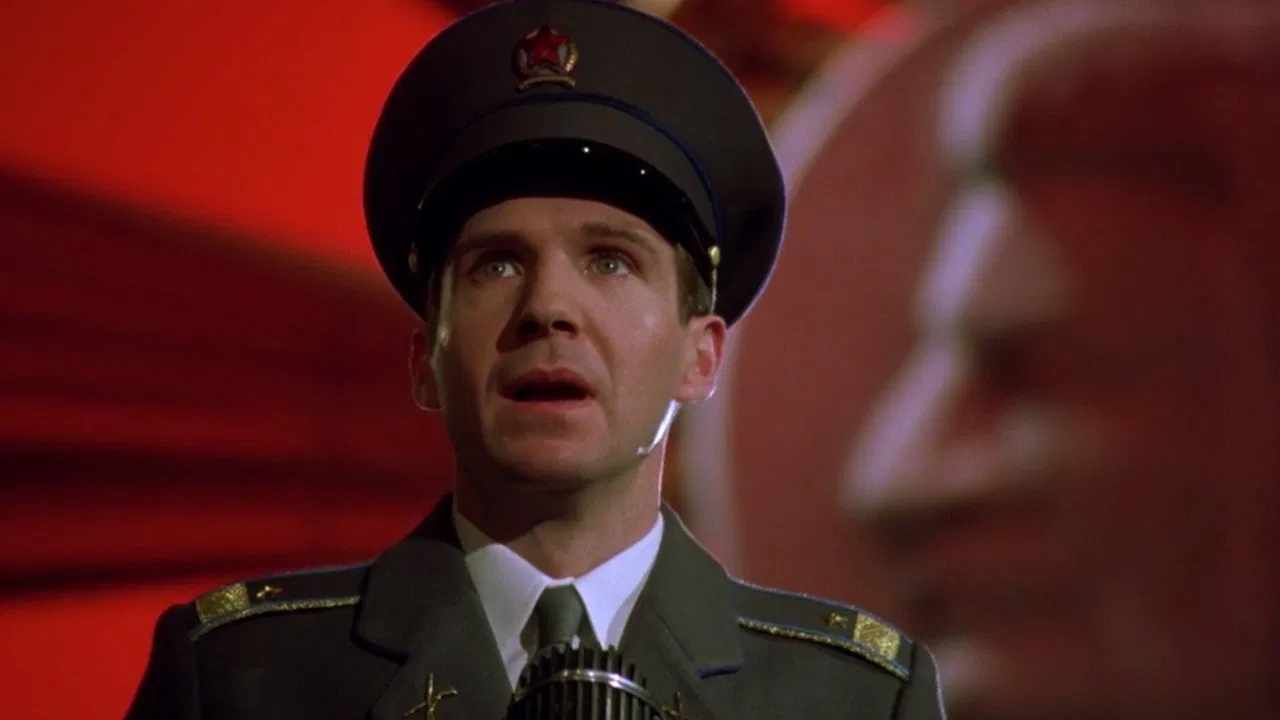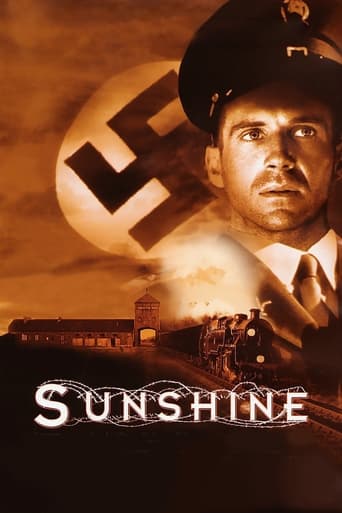

What makes it different from others?
... View MoreThis is one of the few movies I've ever seen where the whole audience broke into spontaneous, loud applause a third of the way in.
... View MoreI think this is a new genre that they're all sort of working their way through it and haven't got all the kinks worked out yet but it's a genre that works for me.
... View MoreGreat movie. Not sure what people expected but I found it highly entertaining.
... View More12 year old Emmanuel Sonnenschein left his village in the Austro-Hungarian Empire after his father died in a distillery explosion. Using his father's recipe, he creates a successful brew called "Taste of Sunshine" in Budapest. He has two sons Ignatz (Ralph Fiennes) and Gustave (James Frain). He also adopts his orphan niece Valerie (Jennifer Ehle). Ignatz becomes a prominent judge and marries Valerie. Gustave becomes a communist. The family struggles continue over the years as Ralph Fiennes plays different characters in each generation of Sonnenschein.This is a big ambitious movie. The idea of playing three generations within the same family may be compelling to Fiennes but they may be better off doing a trilogy. This could be also be a good TV series. There is simply too much material to contain in one sitting. Nevertheless Ralph Fiennes does a great job and the sweep of the whole experience is quite compelling.
... View MoreRalph Fiennes did it again. Six years after his memorable turn as Nazi Amon Goeth in the award winning "Schindler's List," he is at it again, but this time as a member of a Jewish family, taking several parts through the ages leading to the holocaust in Hungary as well as life there after World War 11.The picture is absolutely amazing. It makes you wonder when the family is seen as ultra-religious in years past and then getting progressively less religious with the passing years. You think you've reached the ultimate after the intermarriages begin to take place, only to be followed by the holocaust, where even Baptismal certificates did the newly converted Christians any good. They met their fate in a horrible way. The films proves that you really can't change who you are.
... View MoreIstvan Szabo's "Sunshine" aspires to be an epic, but it doesn't have the ideas to support its epic length.It's a decent enough movie, and Ralph Fiennes gives a characteristically good performance in a monster-sized role, but the subject matter (which covers family strife, revolutions, war and the Holocaust) gives the movie an aura of importance that it doesn't deserve. What Szabo has given us more than anything else is a grand soap opera, a kind of modern-day "Doctor Zhivago." Nothing necessarily wrong with that, but it's not a movie that screams classic.Grade: B+
... View MoreSunshine is one of those films I was predisposed towards liking before I'd even seen it. I liked the idea of a film dealing with three generations of a family (one that goes through war and revolution) and I liked the idea of Ralph Fiennes playing multiple roles. Consequently, I was pleased that the film lived up to my expectations.Ralph Fiennes is unquestionably the main reason why the film works so well. Each character he plays (the narrator, and the narrator's father and grandfather) is distinctive and separate from the rest while also having the traits of previous generations. For instance, each character is passionate and stubborn, and each is caught up in twisted love affairs and has to fight anti-Semitism, but while Ignatz is a free spirit who gradually becomes more and more bitter, Adam is a confident ladykiller and Ivan is a sullen bureaucrat who slowly comes to life towards the end. It's a subtle, unflashy performance, and one that works superbly.It also transcends gimmickry. But while Fiennes deserves credit for making his performance work, the writing and direction are also excellent. I especially like the way that certain themes resonate through the different generations each character has to fight against prejudice, is burned by people in power and has unsuccessful relationships. Times may change but people don't.This sentiment is proved true by the various regimes that inhabit the film. The Hungarian monarchy, the fascist military and the communists may all be different in terms of aesthetics, but at heart they're all the same. They're all power hungry and they have no loyalty towards their citizens; they may preach freedom, but all they want is control and the perks of authority. And through the film those in power betray each successive generation of the Sonnenschein family, and in each case anti-Semitism is at the root of the problem. Not that the family doesn't try its hardest to fit in. Ignatz changes the Jewish surname Sonnenschein to the more neutral Sors so that he can become an important judge. And for a while he prospers, but then the monarchy starts to talk of Jewish conspiracies. However, Ignatz stays loyal and he refuses to join the communists when they briefly take over, leading him to become incredibly bitter and to die a miserable death.But the family doesn't learn. Adam, Ignatz's son, becomes close to the military regime that takes over from the communists by becoming part of the Officer's Club fencing team. But like his father, he isn't allowed to becoming part of the club straight away. He's only allowed to join the elite fencing team after he's converted to Catholicism. The family's identity is being eroded even further. But he's driven to this decision by an inferiority complex. There's a scene where he's bullied by a gang of older boys as a child who mock the fact that he's Jewish. They hold a sword to his throat. They make him apologise for being Jewish and for polluting the air. This drives him towards fencing and he eventually becomes an Olympic champion. But the childhood scene is chillingly echoed in the scene where Adam is taken to a labour camp during the outbreak of the Second World War. The soldiers ask him what he is and he refuses to say that he's a Jew. Instead he says that he's an Olympic gold medallist. He's trying to assert his true identity, rather than the technicalities of birth and heritage. But the soldiers wont have it, and in the most powerful scene in the film, they strip and beat him while continually asking him the same question. He refuses to beg like he did as a child and to apologise for what he is and as a result he's strung up on a tree, and in the dead of winter, is hosed down. The water freezes on him and he dies with his son watching on.But despite watching this atrocity, Ivan (Adam's son) fails to learn the lesson it should teach him. It should teach him never to repeat these sorts of things. But instead, consumed by a desire for revenge and by naive idealism (his championing of Stalin is rather hard to stomach), he joins the communist party that takes over the country after the war. First he's asked to capture the fascists, but then as the communist party proves itself no better than anyone else, he's asked to betray friends based on trumped up charges. He even becomes like the guards who killed his father when he's asked to continue torturing his friend who refuses to confess to being part of a conspiracy. And on top of that he even has to endure more anti-Semitism the Jews make an easy scapegoat when you're incompetent (like the monarchy, the communists fear that the Jews are conspiring to take over the country). But unlike Ignatz and Adam, Ivan gets a second chance. He sees through the crap and leaves the party. And in the end he even changes the family name back from Sors to Sonnenschein. It's an excellent ending. It shows that you can't hide what you are and that it's better to stand up and be counted. Why feel shame for something there's nothing to be ashamed of? However, I do have a couple of minor gripes. First, the set-up is extraordinarily brief. I know the film is fighting for time, but the opening few minutes are a bit of a whirlwind. And secondly, Rachel Weisz's character is incredibly annoying. I didn't enjoy her performance at all. But those problems are nothing really. They certainly didn't prevent me from enjoying the film.
... View More